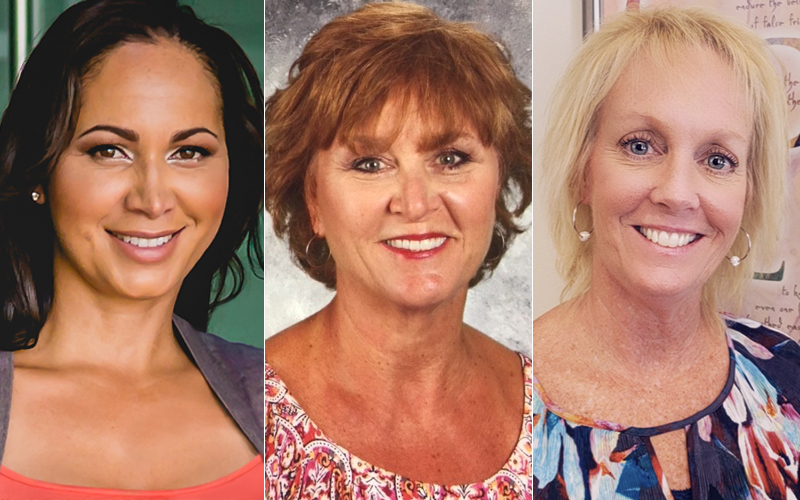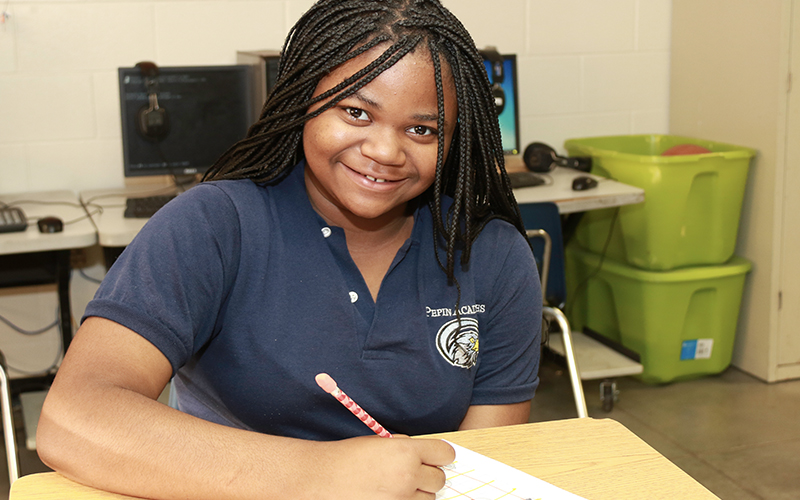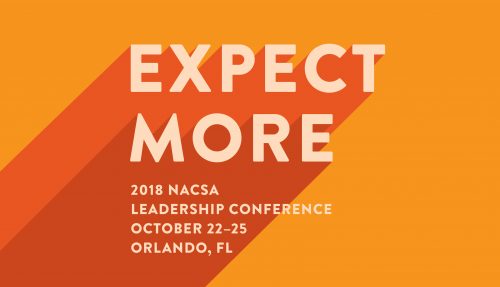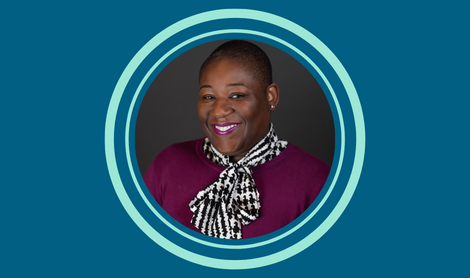
Hillsborough County Public Schools and Pepin Academies
In 1999, three families were concerned about their children’s likelihood of success in a large Florida high school. Empowered by a new state law, they wrote a charter application, hired a principal, harnessed community support, and launched a dream. That first year, 25 students with special needs attended this new school in a partitioned-off space of a one-room church. Today, this public school serves 800 students with a variety of learning exceptionalities, including many on the autism spectrum, through differentiated instruction and programming.
Meet the authorizer: Jenna Hodgens
General Director, Hillsborough County School District Charter Office. In Fall 2018, she’ll have 52 schools within her purview, with six more in planning stages (applications approved). She started as an Exceptional Student Education (ESE) teacher, did stints in psych services and testing, then landed in the charter office in 2002. Jenna has eight staff and a preference for phone communication. She says it helps relationships thrive, since vocal cues convey emotion and intent better than texts or emails ever could.
Meet the school leaders: Monika Perez and Geri Henry
Principals, Pepin Academies Tampa campus and Riverview campus, respectively. Together with a third campus under a different district authorizer, Pepin Academies serve over 1,000 special needs students in 3rd–12th grades, with a transition program through age 22. Monika started as a teacher in Sarasota and now celebrates 14 years with Pepin. Geri, whose daughter was in Pepin’s inaugural class, marks 19 years with Pepin.
How does the authorizer work with the school? What is the school’s role in this successful collaboration with their authorizer? What can you as an authorizer learn? Read on for She Said/They Said.
JENNA (authorizer):
I’ve worked hard to create a positive atmosphere. It’s how I do business, with all our charters. We’ve formed a group of principals that meets monthly. This has built our relationship, so when there are problems, we can deal with them. If parents call with complaints, I point them back to the school, and then alert the school to the concern. It’s this trust that helps solve problems.
MONIKA (principal):
Having that one point of contact—the charter office—guides us in the direction we need to go to find the answers to our questions. They’re kind of a one-stop shop.
JENNA (authorizer):
Open communication—how you listen, and how you speak with honesty, in a helpful not hurtful way—makes a difference. “Instead of ‘You did xyz,’ I say, ‘Listen, I heard about this situation: how can we work together to resolve this?’ You don’t call and accuse, you call and discuss.”

GERI (principal):
We were in a conference with other charters and they clearly didn’t have the same support in their district that we have. Some districts don’t have a designated office focused on charters, and I don’t know how those schools do it. It’s huge to have our district support the charter office, which then supports schools. Without that, it would be difficult for charters to succeed.
JENNA (authorizer):
Pepin leaders plotted on a map where students were coming from, just to get to school. The data convinced me and our superintendent of the need to grow, so a satellite campus was approved. We considered what it meant for students with disabilities to be in a car for over an hour and decided we must do better. It wasn’t just about accommodating MORE students, but accommodating the students they have BETTER.
MONIKA (principal):
We’re in a unique position, serving students with special needs, and this comes with added challenges on legal fronts, accountability, and staffing. It’s important that someone on the authorizing team is knowledgeable on ESE (Exceptional Student Education). Our district rep works with us to be sure we’re in compliance with district and state guidelines.
Looking for ways to help schools like Pepin thrive in your portfolio? Check out NACSA’s Special Education Toolkit for authorizers.
JENNA (authorizer):
How we look at their academic performance is unique. We combine a School Improvement Rating (SIR), based on gains, with other indicators like IEP goal attainment, graduation rates, the number of kids in transition to a viable job, and more. We care if students are in school—thriving and learning. We care about the things that matter for their futures.
GERI (principal):
It’s very rare that we don’t satisfy our parents, but on occasion, a parent may feel like we haven’t provided the services their student needs. In facing legal complaints, the district has provided expertise and helped us gather evidence and respond. When our authorizer can’t help, they connect us with someone who can.
JENNA (authorizer):
Some people assume there’s competition between charters and district schools. We counter that assumption with open communication. We do targeted site visits, not ‘gotcha’ visits. We tell schools when we’re coming and what we’re looking for. When we find something of concern, we ask them, ‘What do you need to succeed?

MONIKA (principal):
When our authorizer connects us with a district resource—such as someone with legal expertise—it’s an opportunity for that person to learn about us. When our schools have suffered crises such as the loss of a student and our executive director, the district sent in support teams (psychologist, counselors, and leadership) to help us handle the emotional difficulties of these traumas. In the process, we build new relationships. They may leave with a different opinion about charter schools: they see how we’re meeting our students’ needs, and our value.
JENNA (authorizer):
The most important thing I can do is keep our board and superintendent informed about our schools and knowledgeable about changes in the law. I have direct contact with our superintendent, through text or calls: there’s an open door to him. We meet at least monthly.
GERI (principal):
I was really impressed that the superintendent came to our high school graduation at Pepin Academies this spring. It’s a large district, with many high schools, and this speaks volumes about the district’s acknowledgement of the role of charters in our district. These are our children, and these are our public schools.
JENNA (authorizer):
Some kids don’t thrive in traditional school settings. Pepin creates a safe haven and is doing great things for their students. They have resources and job training, from culinary arts to computer programming to an on-site cafe. There’s differentiation based on students’ needs and capabilities. These kids are in charge. They feel ownership and pride in their school. They excel.
Editor’s Note: We are grateful to Pepin Academies’ student, Solomon Parris, for his winning submission to our design competition that inspired this year’s conference logo.



